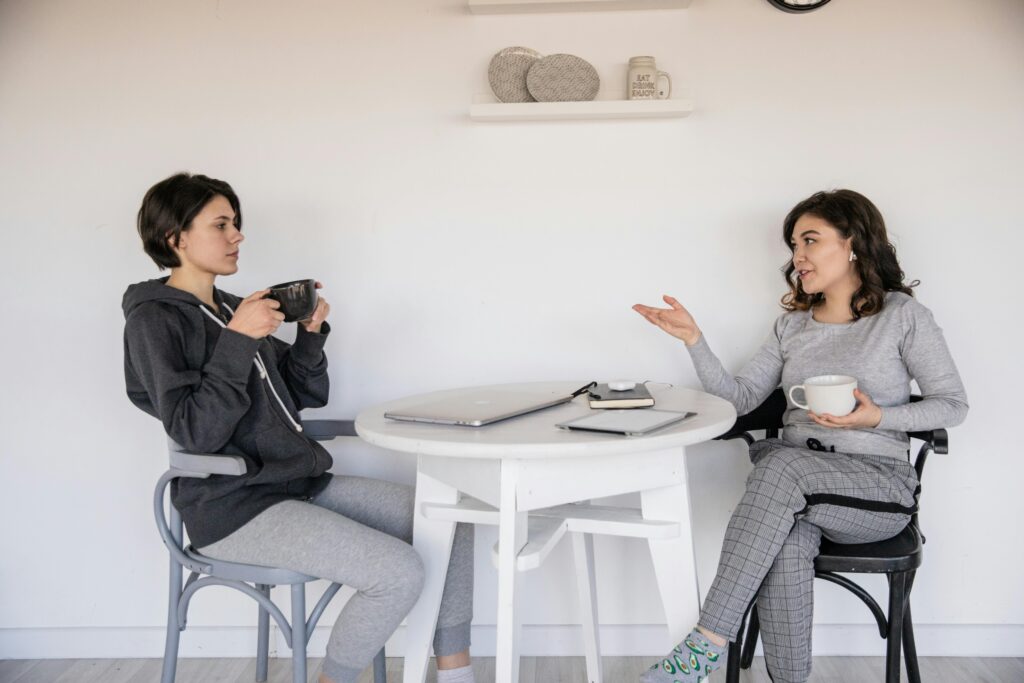Effective talking is crucial in professional life and personal life. Whether you’re looking to enhance your confidence in conversations, become more articulate, or simply feel comfortable speaking in social settings, improving your talking skills can be life-changing. This guide will walk you through practical steps to help you develop and refine your ability to communicate effectively.

Tips on to how to develop talking skills
1. Practice Speaking Regularly
One of the most effective ways to develop talking skills is to speak as much as possible. Engage in conversations with friends, family, and colleagues to gain confidence and fluency. If you don’t have someone to talk to, try speaking aloud to yourself, reading out loud, or even recording your thoughts in a voice journal.
2. Expand Your Vocabulary
Expanding your vocabulary enhances your ability to communicate with clarity and confidence. Immerse yourself in books, podcasts, and engaging discussions to discover new words. Incorporate these words into your daily conversations to solidify them in your memory.
3. Improve Your Pronunciation and Clarity
Clear pronunciation is key to being understood. Practice speaking slowly and enunciating words properly. Tongue twisters, phonetic exercises, and mimicking native speakers can help improve articulation.
4. Listen More and Observe
Good speakers are often great listeners. Observe how effective communicators speak, the words they use, their tone, and their body language. By paying close attention to skilled speakers, you can incorporate their techniques into your own speech.
5. Work on Your Confidence
Lack of confidence can make speaking difficult. Practice deep breathing, maintain good posture, and make eye contact while speaking. Remind yourself that your thoughts are valuable and that people are interested in what you have to say.
6. Structure Your Thoughts Before Speaking
If you struggle with expressing yourself, take a moment to structure your thoughts before speaking. This helps in avoiding filler words like “um” and “uh” and makes your speech more coherent and impactful.
7. Join Public Speaking or Debate Clubs
Organizations like Toastmasters or local debate clubs provide a great platform to practice speaking in front of an audience. These groups offer constructive feedback and can significantly boost your confidence in verbal communication.
8. Engage in Meaningful Conversations
Instead of small talk, try discussing topics that genuinely interest you. When you’re passionate about a subject, you naturally become more engaged and articulate.
9. Use Technology to Your Advantage
There are many apps and online courses designed to help improve speaking skills. Tools like speech recognition apps, pronunciation guides, and conversation practice platforms can provide valuable assistance.
10. Be Patient and Keep Practicing
Improving your talking skills is a gradual process. The more you practice, the more natural and confident you will become. Keep pushing yourself to speak in different situations, and over time, you will see a significant improvement.

Frequently asked questions: Important
1. Can you improve your talking skills?
Yes, improving your talking skills is possible with consistent practice and self-awareness. Engaging in conversations more frequently, actively listening, and expanding your vocabulary can significantly enhance your ability to communicate. You can also improve by studying how effective speakers articulate their ideas and structuring your thoughts before speaking.
2. How to improve verbal communication skills?
Verbal communication skills can be improved by speaking with clarity, using appropriate tone and pace, and practicing active listening. One way to enhance your skills is by reading aloud, which helps with pronunciation and confidence. Additionally, engaging in discussions, debates, or public speaking exercises can refine your ability to express thoughts coherently and persuasively.
3. How can I encourage more talking?
Encouraging more talking starts with creating a welcoming environment where people feel comfortable expressing themselves. You can do this by asking open-ended questions, showing genuine curiosity about others’ thoughts, and practicing active listening. Additionally, sharing your own experiences and stories can prompt others to contribute to the conversation.
4. How to improve communication skills alone?
Improving communication skills alone requires self-practice and mindfulness. You can record yourself speaking to identify areas for improvement, practice articulating thoughts in front of a mirror, or even write down ideas before speaking to enhance clarity. Reading books, watching TED Talks, and observing effective communicators can also help.
5. How can I train myself to speak better?
Training yourself to speak better involves consistent effort and self-reflection. You can start by practicing articulation exercises, working on voice modulation, and eliminating filler words. Joining a speaking club, such as Toastmasters, or engaging in discussions where you challenge yourself to speak more clearly and confidently can also be beneficial.

6. What are the 5 skills in communication skills?
The five key communication skills are:
- Listening: Actively understanding what others are saying without interrupting.
- Speaking: Clearly expressing ideas with confidence.
- Clarity: Organizing thoughts before speaking to avoid confusion.
- Empathy: Understanding and responding to others’ emotions appropriately.
7. What is considered a late talker?
A late talker is typically a child who does not begin speaking at the expected age range. Generally, children start forming words around 12 months and small sentences by age 2. If a child has limited vocabulary or struggles with speech development beyond this age, they may be considered a late talker and could benefit from professional evaluation.
8. How can I train myself to talk more?
To train yourself to talk more, start by increasing your daily interactions, even in small ways. Practice by having conversations with family, friends, or colleagues. Set a goal to initiate discussions, respond with longer answers, and ask follow-up questions. Engaging in social activities and discussion groups can also help you become more comfortable talking.
9. How to do speech therapy at home?
Speech therapy at home can involve practicing tongue and mouth exercises to strengthen articulation, reading aloud, and using apps designed for speech improvement. You can also engage in conversation drills, practice deep breathing for better speech control, and work on pronunciation by repeating difficult words.
10. How to become more articulate and eloquent?
Becoming more articulate requires expanding your vocabulary, slowing down your speech, and structuring your thoughts before speaking. Reading books, practicing public speaking, and engaging in debates can help improve eloquence. Also, observing and mimicking articulate speakers can be a useful learning technique.
11. Why do I struggle to speak so much?
Struggling to speak could be due to anxiety, overthinking, lack of confidence, or social discomfort. Identifying the cause can help you address the issue. Practicing speaking in low-pressure environments and gradually exposing yourself to more conversations can ease the struggle.
12. How do I become a better talker?
To become a better talker, focus on improving storytelling skills, actively listening to others, and engaging in varied conversations. Being aware of your tone, speaking clearly, and practicing confidence-building exercises can also help.

13. Why am I not very talkative?
Being less talkative can be due to personality traits, social anxiety, or lack of interest in certain topics. If you want to be more talkative, practice speaking more in social settings, prepare topics to discuss, and engage in active listening to build conversations.
14. How to be more confident and chatty?
Boosting confidence and becoming chatty requires practice and a mindset shift. Start by smiling more, making eye contact, and engaging in small talk. Positive self-talk and reducing self-criticism can also help you feel more at ease in conversations.
15. How do I stop being quiet and talk more?
To stop being quiet, set a goal to contribute at least one idea in conversations. Join activities that encourage discussion, such as debate clubs or group projects. Practicing daily conversations and pushing yourself to step out of your comfort zone can help build talking habits.
16. How to train yourself to speak better?
Training to speak better involves daily practice in articulation, confidence-building exercises, and expanding your vocabulary. Recording yourself, getting feedback, and working on eliminating filler words can refine your speech.
17. How to stop mumbling?
Mumbling can be reduced by speaking more slowly, pronouncing each word clearly, and practicing speaking with exaggerated articulation. Strengthening the muscles used for speech through exercises can also help.
18. Why can’t I articulate my thoughts clearly?
Difficulty articulating thoughts may come from anxiety, a lack of preparation, or fast thinking. Slowing down, pausing before speaking, and organizing your thoughts in advance can improve articulation.
19. How do I stop being a boring talker?
To be a more engaging talker, add enthusiasm to your voice, use storytelling techniques, and bring in humor. Asking thought-provoking questions and being genuinely interested in conversations also helps.
20. Can I improve my talking skills?
Yes! Talking skills improve with practice, patience, and willingness to learn. Engaging in discussions, working on clarity, and being mindful of how you express yourself can enhance your skills.
21. What are the best conversation starters?
Great conversation starters include:
- “What’s something interesting you’ve learned recently?”
- “What’s your favorite travel destination and why?”
- “If you could have dinner with any historical figure, who would it be?”

22. Why have I become so silent?
Becoming silent could be a response to stress, social exhaustion, or a change in social environment. Identifying the root cause and gradually engaging in conversations can help restore communication habits.
23. How do I train myself to be more talkative?
Set small goals, such as speaking more in meetings or social events. Practicing storytelling, staying informed on current topics, and actively participating in discussions can help.
24. How to go from small talk to deep talk?
Transition from small talk to deep talk by asking meaningful questions, sharing personal experiences, and being open to vulnerability. Listening actively and responding with thoughtful insights also deepens conversations.
25. How do you trigger a deep conversation?
Trigger deep conversations by asking profound questions like, “What’s a life lesson that changed you?” or “What are you passionate about?” Expressing genuine interest and providing thoughtful responses can keep the discussion engaging.



